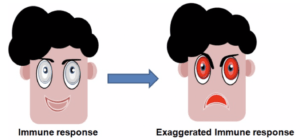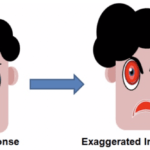Covid-19 is a highly pathogenic and extremely contagious coronavirus, associated with significant morbidity and mortality rates. The most commonly reported manifestation of Covid-19 infection are fever, dry cough and tiredness. Some patients may experience body aches, chest pain, nasal congestion, running nose, sore throat or diarrhoea. These symptoms vary from person to person and approximately 80% of infected individuals recover from the disease without needing intensive medical treatment. However, a subset of people, including aged-individuals and those with underlying medical conditions such as hypertension, diabetes, or cardiac problem may suffer from serious complications.
 Effective host immune responses are required for optimum viral control. Immune reactions to a viral threat, on the contrary, could also be harmful to the host if the response is excessive. Huang et al. noted that upon infection with Covid-19, the initial levels of IL1β, IL1RA, IL7, IL8, IL9, IL10, basic FGF, GCSF, GMCSF, IFNγ, IP10, MCP1, MIP1A, MIP1B, PDGF, TNFα, and VEGF concentrations were higher in both symptomatically mild/moderate and severe cases compared to healthy adults (Huang, Wang et al. 2020). A further comparison between these patients showed that patients with severity of the disease symptoms (which required ICU admission) had higher concentrations of GCSF, IP10, MCP1, MIP1A, and TNFα than did those not requiring ICU admission, suggesting that the inflammation due to the cytokine storm was associated with disease severity.
Effective host immune responses are required for optimum viral control. Immune reactions to a viral threat, on the contrary, could also be harmful to the host if the response is excessive. Huang et al. noted that upon infection with Covid-19, the initial levels of IL1β, IL1RA, IL7, IL8, IL9, IL10, basic FGF, GCSF, GMCSF, IFNγ, IP10, MCP1, MIP1A, MIP1B, PDGF, TNFα, and VEGF concentrations were higher in both symptomatically mild/moderate and severe cases compared to healthy adults (Huang, Wang et al. 2020). A further comparison between these patients showed that patients with severity of the disease symptoms (which required ICU admission) had higher concentrations of GCSF, IP10, MCP1, MIP1A, and TNFα than did those not requiring ICU admission, suggesting that the inflammation due to the cytokine storm was associated with disease severity.
Viral pneumonia can cause development of ARDS (Acute Respiratory Distress Syndrome). ARDS is characterised by acute hypoxia of the lung and systemic inflammation. Yang et al. have observed that most of the critically ill Covid-19 infected patients who died had ARDS (Yang, Yu et al. 2020). Another study by Magro et al. suggested involvement of the complement pathways mediated pulmonary microvascular injury in a subset of Covid-19 patients with severe symptoms (Magro, Mulvey et al. 2020).
Interestingly, one of the earlier study of bats has shown diminished STING (STimulator of INterferon Genes)-dependent interferon responses in bats, that could support it to serve as a reservoir of many viruses, including Covid-19 (Xie, Li et al. 2018). STING driven rapid secretion of interferons are required for setting up the stage for immune responses. The dampened interferon responses in bat were due to the replacement of the serine residue at position 358 in STING, thereby, supporting bats to co-exist with a variety of viruses. In contrast, this serine residue in STING was conserved in human and other mammals. Thus, constitutive activation of STRING due to bat-borne viruses, such as Covid-19 could cause hyper-inflammation in human.
Article by Dr. Dimpu Gogoi (Scientist, ICMR-NIRRH, Mumbai, India)
References
- Huang, C., et al. (2020). “Clinical features of patients infected with 2019 novel coronavirus in Wuhan, China.” Lancet
- Magro, C., (2020). “Complement associated microvascular injury and thrombosis in the pathogenesis of severe COVID-19 infection: A report of five cases.” Transl Res.
- Xie, J., et al. (2018). “Dampened STING-Dependent Interferon Activation in Bats.” Cell Host Microbe
- Yang, X., et al. (2020). “Clinical course and outcomes of critically ill patients with SARS-CoV-2 pneumonia in Wuhan, China: a single-centered, retrospective, observational study.” Lancet Respir Med.
